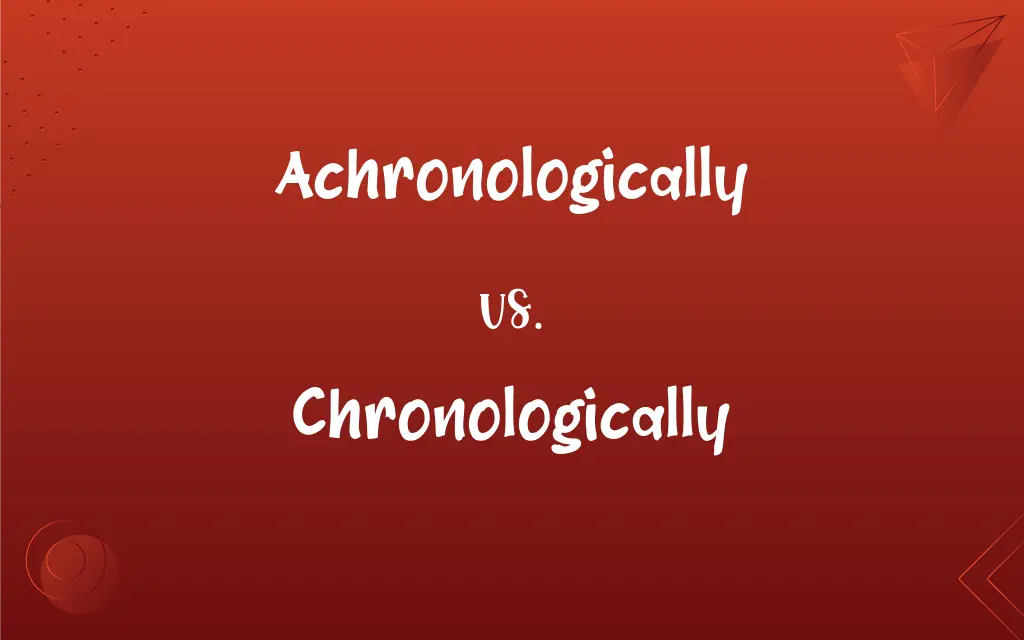Achronologically vs. Chronologically: What's the Difference?
Edited by Harlon Moss || By Janet White || Updated on November 13, 2023
Achronologically means not in chronological order, while chronologically means in order of time, from earliest to latest.

Key Differences
Achronologically refers to presenting events without regard to their temporal sequence, while chronologically means arranging events in the order they occurred. Each approach offers a different perspective on events.
In storytelling, achronologically can create a non-linear narrative, whereas chronologically provides a linear, time-ordered narrative. Both styles serve different artistic and storytelling purposes.
When data is presented achronologically, it does not follow a time sequence, while presenting data chronologically aligns it with the time axis. This distinction affects how information is interpreted.
Achronological analysis disregards the time factor, focusing instead on themes or concepts, while chronological analysis emphasizes the progression of events over time, highlighting temporal relationships.
In research, achronologically arranging information can lead to thematic or conceptual insights, whereas chronologically organizing information helps trace developments and trends over time.
ADVERTISEMENT
Comparison Chart
Order of Presentation
Non-temporal, not in time order
Temporal, in time order
Narrative Style
Creates non-linear narratives
Creates linear narratives
Data Arrangement
Disregards time sequence
Follows time sequence
Historical Analysis
Focuses on themes or concepts over time
Emphasizes progression and temporal relationships
Research Methodology
Thematic/conceptual organization
Temporal/tracking developments over time
ADVERTISEMENT
Achronologically and Chronologically Definitions
Achronologically
Achronologically implies disregarding the chronological order.
The biography was written achronologically, focusing on thematic elements.
Chronologically
Chronologically refers to a time-ordered sequence.
The timeline was arranged chronologically.
Achronologically
Achronologically describes a narrative that jumps across different times.
The film's achronological structure confused some viewers.
Chronologically
Chronologically means arranging events in the order they occurred.
The book chronologically details the history of the empire.
Achronologically
Achronologically means presenting events without a time sequence.
The novel unfolds achronologically, enhancing its mystery.
Chronologically
Chronologically implies a sequential order based on time.
The events in the documentary are presented chronologically.
Achronologically
Achronologically refers to non-temporal arrangement of information.
The exhibition displayed artworks achronologically.
Chronologically
Chronologically describes a linear progression through time.
Her autobiography is written chronologically, from childhood to adulthood.
Achronologically
Achronologically means not following the natural sequence of time.
The lecture covered the events achronologically for emphasis.
Chronologically
Chronologically means following the natural order of time.
The chapters in the history book are organized chronologically.
Achronologically
Without chronological order; in an achronological manner
Chronologically
Arranged in order of time of occurrence.
Chronologically
Relating to or in accordance with chronology.
Chronologically
(manner) In a chronological manner; with reference to time.
He had aged but a year chronologically, but in appearance a decade.
Chronologically
(sequence) In sequence according to time.
His chapters are arranged thematically, not chronologically.
Chronologically
With respect to chronology;
He is chronologically older
FAQs
Is "achronologically" a recent word?
It's a modern term, more prevalent in contemporary discussions.
How do I use "achronologically" in a sentence?
"The story was told achronologically, jumping between various times."
Can history be studied achronologically?
Yes, though it's more common to study it chronologically.
Can "achronologically" be used in everyday speech?
It's more common in academic or formal contexts.
Does "achronologically" have synonyms?
Yes, words like "non-sequentially" or "randomly" can be similar.
Can a book be written achronologically?
Yes, some narratives are presented out of chronological order.
What is an example of "achronologically"?
A movie that starts with the ending and then shows earlier events.
Can events be presented chronologically in a novel?
Yes, many narratives follow a chronological order.
What does "achronologically" mean?
It refers to something not arranged in time order.
Is "achronologically" the opposite of "chronologically"?
In many contexts, yes.
Is "achronologically" a commonly used word?
No, it's relatively less common and more specialized.
How is "chronologically" used in history?
Events in history are often recorded or studied in chronological order.
What does "chronologically" mean?
It refers to arranging things in the order they occurred.
How do I use "chronologically" in a sentence?
"The events in the documentary were presented chronologically."
Can "chronologically" be applied to personal experiences?
Yes, like arranging memories from earliest to latest.
What is an example of "chronologically"?
A biography that starts from a person's birth and follows their life.
Can "chronologically" refer to future events?
Typically, it's used for past or present sequences, but it can be used for planned or expected future sequences.
Is "chronologically" widely used?
Yes, it's a common term in various contexts.
Does "chronologically" have antonyms?
"Achronologically" or "non-sequentially" can be considered antonyms.
Is it easier to follow events when they are in chronological order?
Generally, yes, as it follows the natural flow of time.
About Author
Written by
Janet WhiteJanet White has been an esteemed writer and blogger for Difference Wiki. Holding a Master's degree in Science and Medical Journalism from the prestigious Boston University, she has consistently demonstrated her expertise and passion for her field. When she's not immersed in her work, Janet relishes her time exercising, delving into a good book, and cherishing moments with friends and family.
Edited by
Harlon MossHarlon is a seasoned quality moderator and accomplished content writer for Difference Wiki. An alumnus of the prestigious University of California, he earned his degree in Computer Science. Leveraging his academic background, Harlon brings a meticulous and informed perspective to his work, ensuring content accuracy and excellence.































































